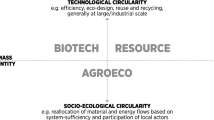
Overview
- This book is open access, which means that you have free and unlimited access
- Explains how Big Data Technology can make raw material gathering more efficient and sustainable
- Shows how common software models can be designed to serve three example sectors in a bioeconomy
- Highlights the use of cloud servers to store and exchange earth observation and sensor data
Buy print copy
Tax calculation will be finalised at checkout
About this book
This edited open access book presents the comprehensive outcome of The European DataBio Project, which examined new data-driven methods to shape a bioeconomy. These methods are used to develop new and sustainable ways to use forest, farm and fishery resources. As a European initiative, the goal is to use these new findings to support decision-makers and producers – meaning farmers, land and forest owners and fishermen.
With their 27 pilot projects from 17 countries, the authors examine important sectors and highlight examples where modern data-driven methods were used to increase sustainability. How can farmers, foresters or fishermen use these insights in their daily lives? The authors answer this and other questions for our readers. The first four parts of this book give an overview of the big data technologies relevant for optimal raw material gathering. The next three parts put these technologies into perspective, by showing useable applications from farming, forestry andfishery. The final part of this book gives a summary and a view on the future.
With its broad outlook and variety of topics, this book is an enrichment for students and scientists in bioeconomy, biodiversity and renewable resources.
Similar content being viewed by others
Keywords
Table of contents (33 chapters)
-
Applications in Agriculture
-
Applications in Forestry
-
Front Matter
-
-
Applications in Fishery
-
Front Matter
-
-
Summary and Outlook
-
Front Matter
-
Editors and Affiliations
About the editors
About the Editors:
Dr Caj Södergård is Research Professor at VTT and Dr. Tech. from Helsinki University of Technology. He has worked as machine vision designer at Decon Oy and as Scientist, Senior Scientist and Area Manager at VTT. He has focused on processing and analysis of big data in media, learning, nutrition, environment and bioeconomy. He has 260 publications and 5 patents. He was in the European High Level Expert Group on Open Science Cloud. He is on the Board for Big Data Value Association and was Chair of the European Big Data Value Forum 2019. He was Technical Manager of DataBio.
Dr Tomas Mildorf is a researcher at the Department of Geomatics at the University of West Bohemia, Czech Republic. Tomas is responsible for European research projects, their management and scientific lead. The main thematic domains include agriculture, rural development, transport and spatial planning. Tomas is the chairman of the Plan4all association andis involved in activities of the Group on Earth Observations, Big Data Value Association and the Open Geospatial Consortium.
Dr Ephrem Habyarimana, Ir, MS, MS, MASt, PhD, a Research Scientist at CREA, Italy, has documented skills and expertise of more than 25 years in agronomy, crop science, genetics and plant breeding integrating diverse technologies i.e., agroecological and genomic modelling, big data analytics e.g., phenomics, genomics for the sustainable crop improvement. He trained in North and Latin America, Africa, Asia, and Europe, authored 40+ scientific papers; is inventor: DeepTech innovations, European DataSci & Artificial Intelligence Awards finalist, co-author of 5 sorghum varieties.
Dr. Arne J. Berre is Chief Scientist at SINTEF Digital and is Innovation Director at the Norwegian Center for AI Innovation (NorwAI). His PhD is from NTNU in 1993 is on the topic of Systems Interoperability. He is the leader of the BDVA TF6 on Technical priorities and is involved in ISO SC42 on AI and Big Data. He was responsible for the platform reference model in the DataBio project. He has been in the technical lead of more than 20 European projects and has more than 100 scientific publications.
Dr. Jose A. Fernandes is a scientist from computing and artificial intelligence studies with the skills and experience needed to translate the data into valuable information for marine research. These skills are curiosity, multidisciplinary communicative, biological, oceanographic, economic, statistics and machine learning expertise. Current line of research is about mitigation of impacts and long-term sustainability of fisheries using the above skills. He has over 120 publications, 40 in scientific publications in high impact journals.
Dr Christian Zinke-Wehlmann is a research group leader for “Efficient Technology Integration” at the Institute for Applied Informatics at the Universityof Leipzig. Working at the edge of technology, work, and service systems, he became a doctor in 2017. His research concentrates on Linked Data, Data Analytics, Data Visualisation, Service Engineering and Management, as well as Knowledge Management. This expertise is represented in this publication and in more than 40 other publications.Bibliographic Information
Book Title: Big Data in Bioeconomy
Book Subtitle: Results from the European DataBio Project
Editors: Caj Södergård, Tomas Mildorf, Ephrem Habyarimana, Arne J. Berre, Jose A. Fernandes, Christian Zinke-Wehlmann
DOI: https://doi.org/10.1007/978-3-030-71069-9
Publisher: Springer Cham
eBook Packages: Biomedical and Life Sciences, Biomedical and Life Sciences (R0)
Copyright Information: The Editor(s) (if applicable) and The Author(s) 2021
Hardcover ISBN: 978-3-030-71068-2Published: 14 August 2021
Softcover ISBN: 978-3-030-71071-2Published: 14 August 2021
eBook ISBN: 978-3-030-71069-9Published: 13 August 2021
Edition Number: 1
Number of Pages: XVI, 423
Number of Illustrations: 9 b/w illustrations, 183 illustrations in colour
Topics: Forestry, Agricultural Economics, Big Data, Environmental Economics



